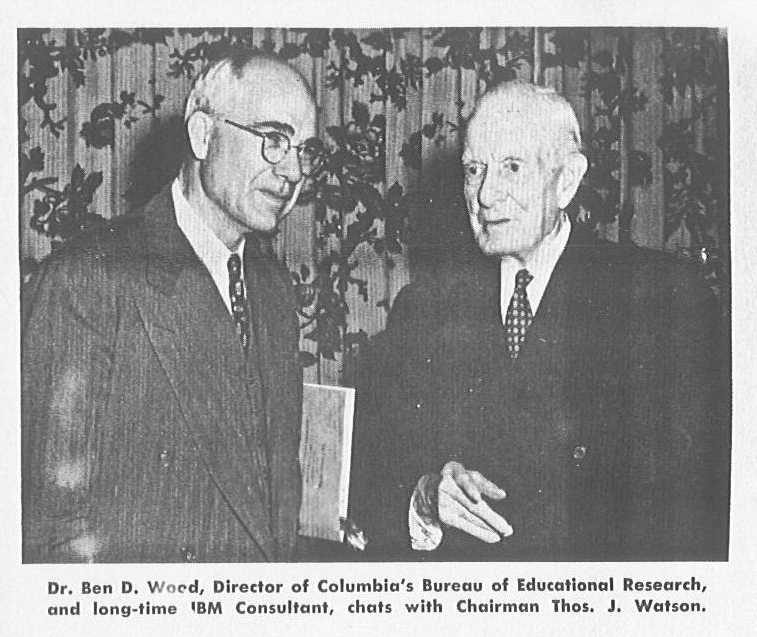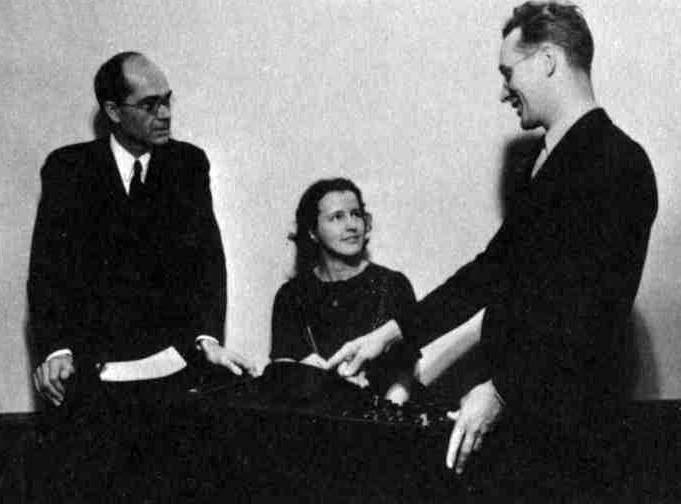Columbia University Professor Ben Wood

Ben Wood came to Columbia as an instructor in education in 1921, and was a professor from 1924 until he retired in 1962. By the late 1920s, Wood was head of Columbia's Bureau of Collegiate Educational Research, and was interested in automation of test scoring. He wrote to a number of office-machine companies about the problem but struck a responsive chord only at IBM, where he had an unheard-of day-long interview with company president Thomas J. Watson (pictured above many years later), who promptly gave him several truckloads of punched-card equipment, with which Wood established Columbia's first mechanized computing laboratory, the Columbia University Statistical Bureau, in 1929, Wallace Eckert's first exposure to punched-card equipment.

|
| Ben Wood and Reynold Johnson [103] |
References:
- Bashe, Charles J.; Lyle R. Johnson; John H. Palmer; Emerson W. Pugh, IBM's Early Computers, MIT Press (1985) [4].
- Brennan, Jean Ford, The IBM Watson Laboratory at Columbia University: A History, IBM, Armonk NY (1971) [9].
- Eames, Charles and Ray, A Computer Perspective: Background to the Computer Age, Harvard University Press. First Edition 1973; Second Edition 1990 [103].
- Pugh, Emerson W., Building IBM: Shaping an Industry and its Technology, The MIT Press (1995) [40].
- Wood, Ben D., "Analysis of College Test Results", in Baehne, George W., Practical Applications of the Punched Card Method in Colleges and Universities, Columbia University Press (1935) [91].
- IBM, Educational Research Forum Proceedings, Endicott NY, August 25-29, 1947 (contains numerous articles on test scoring, surveys, and educational measurement, as well as uses of automation in school administration).
- Richard Warren and Robert F. Mendenhall, The Mendenhall-Warren-Hollerith Correlation Method, Columbia University Statistical Bureau (1929): "This monograph has been prepared by Messrs. Warren and Mendenhall and is issued by the Columbia University Statistical Bureau, in answer to many requests for a detailed description of the Mendenhall-Warren-Hollerith correlation method, which was briefly described in a paper read before Section Q of the American Association for the Advancement of Science in December 1928." —Ben D. Wood (from the Introduction). Includes plates (photographs) of punched-card equipment 44-55. Thanks to Allan Olley at the University of Toronto for unearthing this obscure document. A copy is archived locally in PDF format in case Internet Archive disappears, but it lacks the plates (and you have to scroll down past some blank pages at the beginning).
Links:
- Columbia Statistical Bureau
- The Ben and Gracy Wood Legacy (Columbia Teachers College)
- Educational Testing Service. Wood became president of ETS when he retired from Columbia in 1962; today its main building is the Ben Wood Building.
- Reynold P. Johnson biography (National Academy of Engineering)
- Automated TestScoring, IBM 100, accessed 26 December 2019.